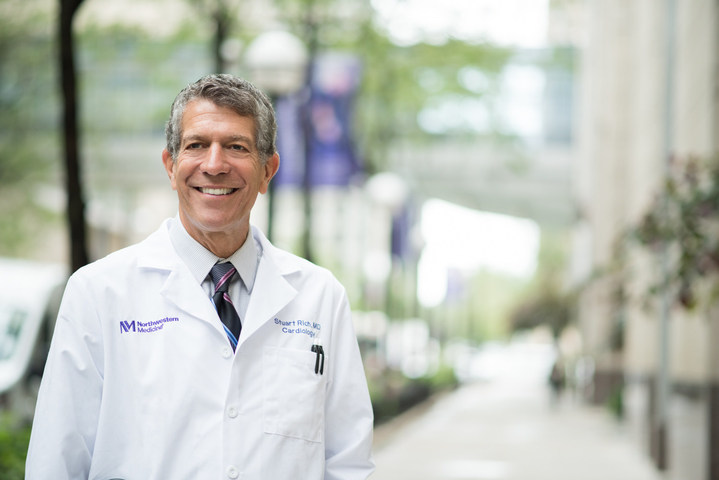Northwestern’s Pulmonary Vascular Disease Program Wins PHA Accreditation

Stuart Rich, MD, a pioneer in the treatment of pulmonary hypertension, is director of the Pulmonary Vascular Disease Program at Northwestern Medicine's Bluhm Cardiovascular Institute.
Northwestern Medicine’s Pulmonary Vascular Disease Program has won accreditation as a Comprehensive Care Center by the Pulmonary Hypertension Association (PHA), in recognition of its excellence in diagnosis, research and clinical care of PH patients.
To earn the accreditation, the program, which is led by Stuart Rich, MD, and is part of Northwestern’s Bluhm Cardiovascular Institute in Chicago, demonstrated expert and quality collaboration among its pulmonology, cardiology and rheumatology departments, as well as excellence in pharmacology and nursing.
“There is an urgent need for medical institutions to accurately diagnose, treat and provide support for pulmonary hypertension patients,” Rich, a cardiology professor at Northwestern University Feinberg School of Medicine, said in a news release. “Our hope is that this accreditation helps us connect with healthcare professionals throughout the United States to ensure that more people living with pulmonary hypertension receive the correct diagnosis early and that they will get the very best care available.”
PH is a rare, progressive disease in which the right side of the heart is pressured, potentially to the point of right heart failure. Shortness of breath, fatigue and chest pain are all symptoms frequently reported by patients, which is why sometimes the condition is mistaken for asthma or other less-threatening diseases. Patients can go months, or years, without knowing about their condition, and the average survival rate without treatment is about 2.8 years after diagnosis. Many patients are hospitalized due to complications and some require transplantation if therapies do not work.
Carol Mazur, 61, of suburban Chicago, has PH due to a congenital heart defect which doctors only detected when she was 23. At the age of 38, doctors told her she had no more than five years to live. She met Rich while looking for a second opinion.
“I have such great faith in the way he treats me,” said Mazur, who’s been treated by Rich for more than two decades. “He looks at me as a whole person, not just as some little case. He’s very calm and patient and smart in a practical way about what you should or should not do, or worry about or not worry about.”
The PHA established its accreditation program in 2011 to recognize U.S. centers with special expertise in PH, particularly pulmonary arterial hypertension (PAH). Centers accepted into the program demonstrate a commitment to providing expert-level care based on guidelines evaluated by the PHA’s Scientific Leadership Council. A requirement of accreditation is enrolling PH patients into the Pulmonary Hypertension Association Registry (PHAR), an organized system of data collection used in both clinical care and disease research.
The Bluhm Cardiovascular Institute‘s Pulmonary Vascular Disease Program ranks among the nation’s largest and most advanced treatment and research programs for PH patients. It offers a full range of services that include comprehensive patient evaluation, diagnostic testing, advanced treatment options, clinical research and patient education.
“At the Bluhm Cardiovascular Institute, we are always looking for the most advanced and most effective treatments for cardiovascular disease in its many forms,” said Patrick McCarthy, MD, the institute’s executive director. “Our cardiovascular care, from treatment of myocardial infarction to bypass surgery to pulmonary hypertension, is distinguished by a variety of different measures, including this recognition.”
The Bluhm Cardiovascular Institute is a nationally recognized destination for those requiring highly specialized cardiovascular care. In 2016, U.S. News & World Report ranked it sixth in cardiology and heart surgery in the United States, and first in Chicago.







